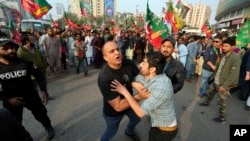Tens of thousands of supporters of Pakistan’s jailed former prime minister, Imran Khan, rallied countrywide Sunday, despite an ongoing state crackdown. They renewed a pledge to vote for his candidates in the February 8 national elections.
Khan, 71, had urged election nominees from his Pakistan Tehreek-e-Insaf, or PTI, party to organize the campaign processions to mobilize voters for the national and provincial elections, already plagued with allegations of pre-poll rigging and claims the military is interfering in the electoral process to impact the outcome. The military has not responded to the allegations.
Sunday’s massive response to his call reflected the results of recent public opinion polls, which indicated that Khan is the most popular politician in Pakistan and the PTI is the largest national political party.
In Karachi, the country’s largest city, police used tear gas and batons to disperse thousands of his supporters, arresting more than two dozen of them. Police officers defended their action, saying PTI leaders did not seek permission to organize the political activity.
The PTI denounced the crackdown on an election rally in Karachi as “one of the most shameful acts.”
Rallies elsewhere in Pakistan, including Lahore, Rawalpindi, Peshawar, Faisalabad, and other major cities, ended peacefully despite police withdrawing or declining permission for the gatherings.
Since his ouster in an April 2022 no-confidence vote, the cricket hero-turned-prime minister and his party have faced significant obstacles leading up to the February vote.
PTI has been barred from holding public gatherings, and dozens of its key candidates have been disqualified from the elections.
Earlier this month, a controversial court ruling denied the party the use of its iconic cricket bat logo on ballot papers, significantly undermining its chances in a country where electoral symbols are crucial to identify candidates in rural areas with traditionally high illiteracy rates. Khan’s name has also been banned from mainstream Pakistani news channels.
The deposed prime minister alleges that the powerful military orchestrated his removal from office at the behest of the United States and subsequent anti-PTI measures. Washington and Islamabad deny his allegations.
Khan was jailed following a graft conviction last August for allegedly selling state gifts. He accuses the military of being behind nearly 200 charges against him, ranging from rioting and corruption to terrorism.
Major internet disruptions have also affected PTI’s repeated attempts to hold virtual campaign rallies to bypass mainstream media restrictions. Telecom authorities have been widely accused of blocking access to social media platforms from within Pakistan.
Censorship
Meanwhile, the caretaker government of Prime Minister Anwaar-ul-Haq Kakar has increasingly been accused of stifling freedom of speech in the run-up to the polls.
The Federal Investigation Agency, or FIA, summoned dozens of Pakistani journalists, political commentators, and YouTube show hosts over the past week to respond to charges they were running a “malicious social media campaign” against Supreme Court judges.
At a news conference in Islamabad, Murtaza Solangi, the caretaker information minister, confirmed Sunday that the FIA had issued notices to journalists and others.
“An investigation is underway. We are monitoring hundreds of accounts, and action will be taken against them,” he said. The minister said more than 500 social media accounts had participated in the anti-judiciary campaign.
Independent critics and journalists have heavily criticized the country’s Supreme Court since it banned the PTI from using the cricket bat symbol, with many denouncing the move as pre-poll rigging.
"Escalating levels of censorship on the media and seemingly deliberate internet outages to curtail digital assemblies appear to target a particular political party and its voter base,” said the independent Human Rights Commission of Pakistan in a statement Saturday.
“The notices issued by the FIA to scores of social media users for an allegedly ‘malicious campaign’ against the superior judiciary underscore[s] an increasing assault on people’s right to freedom of expression,” the monitoring group said.
Most analysts and television talk shows have described the political campaigning as subdued or lackluster, citing a few major rallies, lack of voter interest and economic pressures facing many in the country of about 245 million.
Three-time former Prime Minister Nawaz Sharif and his Pakistan Muslim League-Nawaz, or PML-N party, are seen as front-runners, but he has barely been seen on the campaign trail.
Bilawal Bhutto Zardari, who heads the other major dynastic political party, the Pakistan People's Party, has been more active in campaigning.
Khan has accused Sharif of striking a secret deal with the military to return to power through a rigged election, charges both deny.
The military directly ruled Pakistan for more than three decades, and generals are constantly accused of playing a role in making or breaking elected governments.




